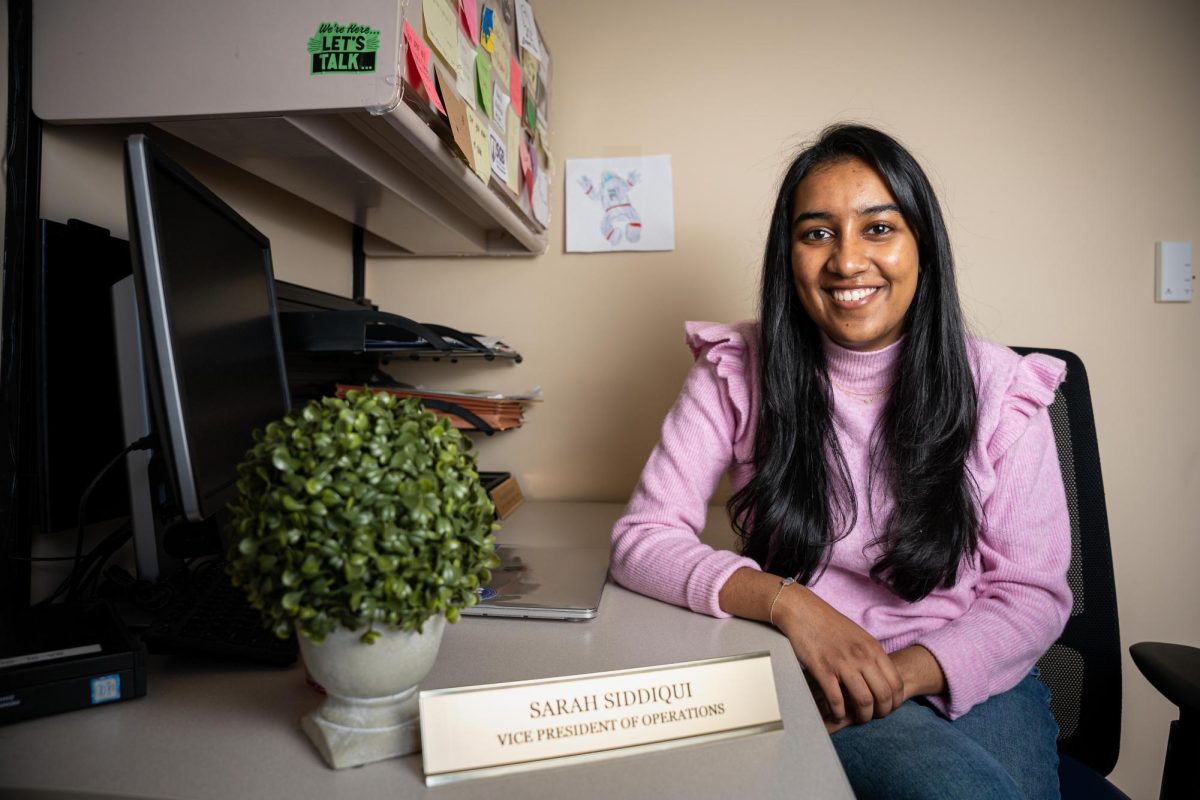Student Government Board’s office is filled with colorful Post-it notes with scribbles of positivity — “Have a nice day <3” scratched into a bright neon pink, “Happy birthday!!!” on a pale blue or even just a quick portrait on the whiteboard. They glow against the beige walls of the eighth floor of the William Pitt Union, making the space look less like an administrative office and more likea room defined by community and connection. That is Sarah Siddiqui’s mission, not just as vice president of operations for SGB, but as a member of the Pittsburgh community.
Siddiqui is a junior sociology major and part of the Guaranteed Admissions Program at Pitt’s medical school, which secures a spot for “outstanding high school students seniors” interested in attending after graduation. Siddiqui knew as a first-year that she was going to be in Pittsburgh for a while, so she had made it her mission to become part of the Pittsburgh community.
“I think it’s a big decision to make. I think I was 18 at the time when I decided to come to Pitt. [I thought], ‘This is gonna be my home, and I will make the best out of it,’” Siddiqui said, painting the image with her hands as she talked at her desk in the SGB office.
Her desk is a canvas for the Post-it notes. “I love you!” and “best vice-president ever!!!” surround her name. To her right, a whiteboard boasts the office members’ portraits. At the bottom, it reads “Let Sarah know if you want a portrait!”
Her work at SGB ties in with her general interests in policy, especially health. Last year, she worked as chair of SGB’s wellness committee, and in the summer after her first year, she interned for the U.S. Senate.
“I think there is a lot of individual-level impact that you can make as a physician and as a clinician,” Siddiqui said. “But I think there are also broader community-level and social-level impacts that you can make through policy.”
To continue her passion in health policy, Siddiqui will graduate a year early, and will be a full-time grad student next year studying on the health policy and management track before medical school.
“This is my last year of undergrad. It was very bittersweet, very sad, but I really love Pitt and I will still be at Pitt,” Siddiqui said.
As SGB’s vice president of operations, Siddiqui supports students and organizations through funding and other services, such as organizing free legal consultations for students, connecting students with free student subscriptions to New York Times and allocating the $900,000 student activities budget, which has received a one-time expansion of $200,000. This increase comes from the almost doubled volume of requests from student organizations this year. Siddiqui doesn’t see it as a problem, but as a sign that students feel comfortable requesting funds.
“On one hand, it’s amazing that student orgs recognize this process and know they can use this process, but on the other hand, we have a very finite amount of funds, so it becomes difficult to equitably distribute it,” Siddiqui said.
Students are a priority for Siddiqui. SGB President Ryan Young, chair of the allocations committee, Maddie McCann-Colvard and Siddiqui wrote a letter for interim vice provost Carla Panzella to request more money for the allocation process. While Siddiqui mentioned that the job was shouldered as a team, her colleagues couldn’t help but emphasize her effort and kindness. Young, a mathematics, physics and astronomy major and Siddiqui’s running mate, highlighted Siddiqui’s role in ensuring every student received the help they needed.
“We had a group come to us recently looking to get funding for a trip, and she’s gone out of her way to make sure [they get it financed]. They couldn’t get all the money because there’s a cap in our allocations process, but we have another thing called the Undergraduate Conference Fund, and she’s meeting with them to make sure that all the money gets there,” Young said.

Siddiqui is open to understanding critiques, from unfulfilled budgets to uncomfortable situations for club administrators. During SGB’s open meetings, she often has the chance to directly address any positive or negative experiences that emerge from the allocation process.
“We were talking to some people, and they had mentioned that they had went through the allocations process recently, and kind of had a bad experience. So she’s on it, asking them how it went and working on rectifying it too,” Young said. “She really cares about the experience of students going through the process because it can be very scary.”
Katie Emmert, an SGB board member and Siddiqui’s roommate, explained how much time Siddiqui spends on her job as a bridge for the students and the administrative processes.
“I learn so much from Sarah by being her roommate and peer,” Emmert said. “Sarah genuinely loves helping people and I always see her jump into action to support someone or answer a question whether it’s at home or in the office, early in the morning or late at night. She makes herself available immediately when needed and I am constantly in awe at the way she prioritizes helping and supporting others.”
Outside of SGB, Siddiqui participated in a plethora of student organizations and causes — she’s a part of PittServes’ Student Civic Engagement Council, the vice president of PERIOD@Pitt and an in-home tutoring coordinator and ESL tutor for refugees at Pitt FORGE.
“She’s also dedicated herself to addressing menstrual inequity,” Emmert said noting Siddiqui’s willingness to make herself available to student groups working on menstrual equity projects and writing a proposal for a menstrual product vending machine. Siddiqui proposed a contraception vending machine in Ward Allebach’s sustainability class, which she hopes to implement on campus sometime this year.
Siddiqui’s presence and contributions through campus seem as bright as the Post-its in the eighth floor office of SGB. President Young mentioned that she was the one who started the trend of messages that decorate the SGB office.
“She kind of started it! She’s really into those little things,” said Young.
Service is a way for Siddiqui to bring some happiness into people’s lives. When asked what question lives in her mind, the answer came naturally.
“How can I make someone smile today?” Siddiqui asked.


